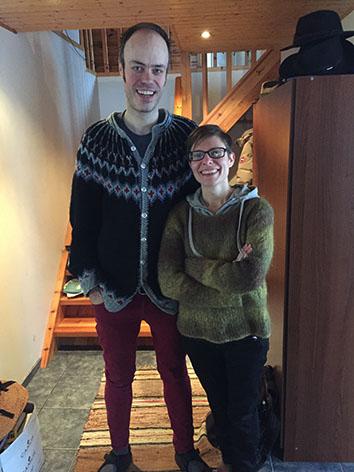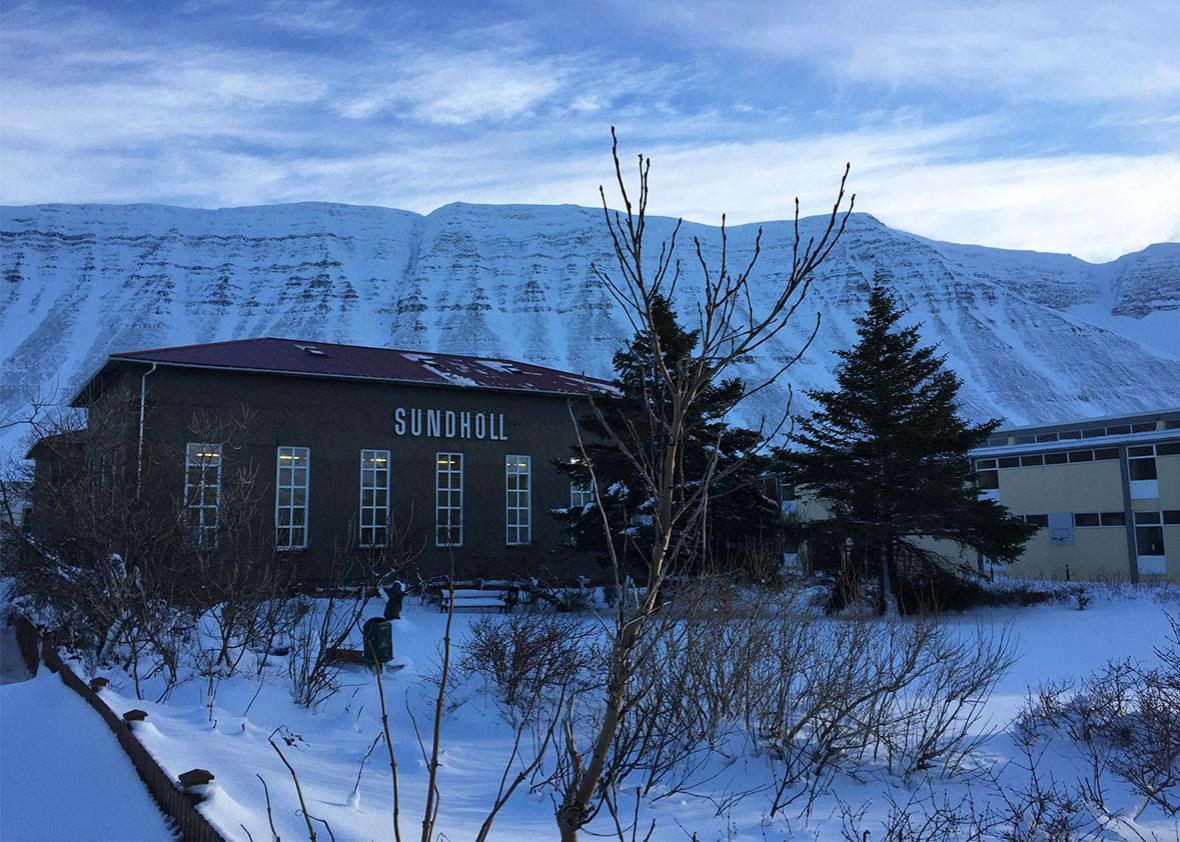Ísafjördur, the biggest town in the remote Westfjords, is a 45-minute flight from Reykjavik. My shuddering propeller plane flew into the throat of Ísafjördur’s valley, banking sharply left quite close to one steep mountain wall, then skimmed black, windswept water before landing.
The town itself sits on a spit in the middle of the fjord, hemmed in on all sides by formations that are either enormous hills or quite small mountains. In sunny weather the mountains appear vividly and sharply present, the white snow distinct against countless black lava-rock outcroppings, the binary patterns it forms as satisfying to the human eye as a QR code is to a hungry optical scanner. In the gales that come frequently in the winter, the mountains appear as menacing, hazy black and gray shapes, indistinct monsters waiting patiently to approach. (When I was in the Westfjords, the avalanche risk was officially categorized at 3 out of 5, “considerable danger.”)
I was in Iceland to report on the nation’s remarkable municipal pools, which seem to reside at the center of civic life. I ate dinner my first night in Ísafjördur at the overstuffed house of artists Lisbet Hardadottir Olafard and Gunnar Jónsson and their five children—six, counting the teenager they are fostering. Lisbet’s fiery personality suits her art, which is angrily, outspokenly political; Gunnar, who is more reserved, showed me his recent piece, a nearly silent 12-minute video of a fishing boat sailing in circles.
“People have all these social conversations in the pools,” I asked. “But do they ever actually fight about politics?”
“Yes, I’ve seen that,” Gunnar said.
“No!” Lisbet said. “That never happens. No one ever actually disagrees in the pool.”
“I guess perhaps not,” Gunnar said.
“But in a way the swimming pool is a war zone,” Lisbet said. “Not because people are arguing but because people really go there, so when there is a disagreement of some kind in the town, the pool is where it plays out.” A case in point, she said, was the sauna drama currently embroiling Ísafjördur.
The 70-year-old swimming hall, designed by the midcentury national architect Gudjón Samúelsson, has a very small sauna attached to one dressing room. (The dressing rooms are swapped daily so both men and women get a chance to steam.) Recently a small laminated sign was tacked next to the door—at the mayor’s behest, according to pool employees: “PLEASE WEAR A SWIMSUIT OR A TOWEL WHEN GOING TO THE SAUNA.” Factions had formed. An open letter had been posted. An article had run in the local newspaper. It had been reported as far away as Reykjavik.
Gunnar and Lisbet were on the side of nudity. “What are you afraid of sitting with a naked person?” Lisbet asked. “You afraid it will poke your eye out?”
Palli Gunlaugsson, who lives next door to Lisbet and Gunnar, grew up swimming in Ísafjördur’s pool and now works there. He’s little and wry, with shaggy snowboarder hair. At the pool, he and his co-worker, Blómey Karlsdóttir, alternated explaining the sauna drama and opening the office door to tell off the two boys misbehaving in the pool.
“They are naked in the sauna in the capital of the sauna culture, Finland,” Palli said. “And some people here want to do that, though”—he shrugged, raised an eyebrow—“there are very few people from Finland in Ísafjördur.” After the sign went up, a local writer—who, Blómey and Palli note, is married to a Finn—published an over-the-top “open letter on account of swimsuit dementia,” which claimed that wearing swimsuits in the sauna was disgusting. The letter was signed by quite a few residents, including, yes, some Finns.
“The people who don’t want to go naked also feel it’s disgusting,” Palli pointed out. There are two levels of seats inside the sauna, “so if you are on the bottom row you are right in someone else’s … area.”
Blómey opened the door and shouted in Icelandic. The boys leaped from the 8-foot-high window wells into the water. She shook her head. “And then there are the stains,” she prompted.
“I suppose they are not washing enough,” Palli said with a grimace. “I clean the benches, and there’s things on the bench that should not be on the bench.”
I took this shocking charge two blocks away, to the home of the author of the open letter, the poet and novelist Eiríkur Örn Norddahl. He and his wife, Nadja Widell, a French teacher at the local school, pooh-poohed the report of skid marks. “No, I don’t believe that,” Nadja said. “What is the pool water like if people aren’t wiping their asses?” Eiríkur demanded.

Dan Kois
In his home Eiríkur did not wear the bowler hat that has become his trademark in the Icelandic literary scene; he wore red pants and one of those intricate wool sweaters that I had assumed, based on their prevalence in puffin-filled gift shops, are the domain of tourists but are in fact worn by basically every single Icelander. Eiríkur’s open letter is a complicated text, befitting a winner of the Icelandic Literary Prize. He wrote:
It is greatly unsanitary to bring dirty, chlorinated swimsuits—drenched in dirt and bacteria, which are well fostered in the fabric until the suit hits the heat and its nasty abominations dissolve and desecrate … the senses of men (and women), their bodies and souls, so that they return to the world sickly and diseased, and not invigorated and spirited, as they had planned.
I noted that the letter’s tone was heightened and satirical, yet it nonetheless reflects Eiríkur’s actual, passionately held view. “Yes,” he agreed. “It’s as if Jonathan Swift really wanted to eat babies.” When it was posted on the website of the local newspaper, the first comment, Eiríkur said, was from his sister-in-law, who lives next door to him. “I feel nothing tasteful looking up into the groin of another person when I go into the steam,” she wrote. Nadja protested: “She doesn’t even go to the sauna!”
At any rate, shortly thereafter the sign was removed. “I sit there naked,” Eiríkur told me, “until the day I die.” But he thinks the town has moved on. “There were people who were offended, but I think it has completely blown over by now.”
Nadja laughed. “That’s because you work from home! I hear about it every day.”
Sweating in the sauna one morning, two of Nadja’s colleagues at the school and opponents on this issue told me the one place the sauna drama would never take hold was in the sauna itself. “I believe one should wear a suit,” said Janus Frach, a music teacher. “But if anything is said or written out there, it doesn’t come in here.”
“We would never argue about it,” said Emil Emilsson, who teaches special education, squeezing a drop of orange-scented oil into a ladle of water and then spilling it onto the hot coals. “It is written on the walls—that is not allowed.”
Snorri Grimsson, a ruddy liquor-store manager, snort-laughed. “Until the Finns arrive,” he said.
